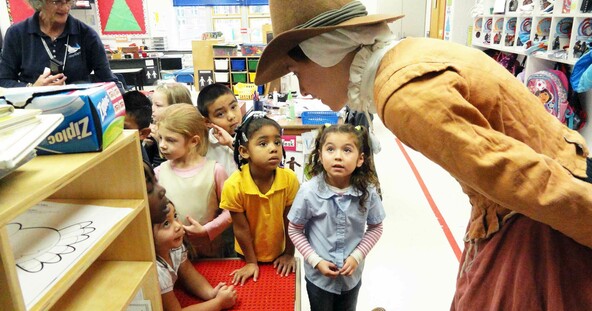
Classroom Visits
Can't travel to us? Bring Plimoth Patuxet Museums to you!
Plimoth Patuxet’s Museum Educators visit classrooms all over the country where they help students explore intertwined cultures, investigate changing landscapes, and understand 17th-century worldviews through immersive hands-on experiences.
Museum Educators are experienced working with students and facilitate age-appropriate, nuanced, historical conversations about Wampanoag and colonial history, culture, and community with sensitivity and empathy. Each program weaves historical background with plenty of hands-on exploration and activities. Some programs may require a large open area such as a gymnasium. Programs can be held outside, weather permitting. Please make sure to have a backup indoor space reserved.
Plimoth Patuxet’s education programs are designed to align with Massachusetts Social Studies Curriculum Frameworks and National Council for Social Studies Curriculum
Classroom Visits
School Programsfor Young Learners (PreK - 2nd Grade)
This special version of our popular "People of the Dawn" program is especially for early learners. It features Wampanoag/Algonquian traditions passed down for generations, and explores Wampanoag life through reproduction artifacts and animal furs.
Experience the 1621 harvest feast through play! First, hear the story, then play the story by rotating through centers with reproduction Wampanoag and Colonial objects.
Discover how archaeology and oral tradition helps us better understand how Wampanoag People lived in the 1600s and how they carry on traditions today. Students will learn about the importance of pottery to Wampanoag families and make and take their own pot using traditional methods.
Did you know the Pilgrims saw themselves as "very expert in music?" After learning about the role of music and dance in 17th-century English communities, students learn popular songs from the 1600s and try a traditional English country dance.
School Programs for Elementary & Middle School
Students discuss the many different ways 17th-century children were educated, whether in a classroom, through an apprenticeship, or at home. Try writing with a quill pen and ink and compare it to today's writing tools. Create a unique 17th-century signature to take home.
Young citizen-students explore the Mayflower Compact as a founding document of our democracy and create their own unique 17th-century signature with quill and ink.
Learn about early Plymouth Colony from an actual Pilgrim in your classroom! Our museum educator will use a real person's life story to frame the one-hour program. Using reproduction artifacts to enhance your classroom's experience, your visitor will share the Pilgrim story-from leaving England and Mayflower's journey to the first winter in New England and the 1621 harvest feast known today as Thanksgiving.
An Indigenous museum educator will discuss Wampanoag People's relationship to the land, respect for all living beings, and seasonal ways of life. Students will handle traditional artifacts and animal furs and may also play a traditional game.
Students work in teams and use clues hidden in historic art to discover the identity of a mysterious artifact.
Wampanoag children learned through stories and play. Students enjoy a retelling of the classic story, "The No Faced Doll," and make their own cornhusk doll to take home.
Mayflower is preparing to leave England. Is your family ready? In this team building activity, you'll race against the clock to make sure all your supplies are safely stowed away in the hold. But watch out! New arrivals may mean you need to make difficult decisions about what goes and what will stay behind.
School Programs for High School and College/University
Explore the 1621 alliance between Plymouth Colony and the 17th-century Wampanoag community of Pokanoket. Students will become leadership consultants to the Pokanoket sachem Ousamequin and Plymouth Colony Governor John Carver, and use primary sources to decide how to advise these leaders. Should they agree to this alliance?
Discover the Mayflower Compact-and those individuals who crafted it-as inspiration for the democratic vision of our nation's founders. Students engage with the original language of the document to better understand the Mayflower Compact as an example of government by the consent of the governed before drafting their own class compact.
Join an Indigenous Museum Educator for a unique conversation that explores 12,000 years of Wampanoag history. Discover how communities past and present have adapted and sustained their way of life amid changing natural, social, and political landscapes.
School Programs for All Ages
"Aren't you hot in those clothes" Join a museum educator for a fun, interactive sneak-peek into a 17th-century wardrobe and discover how the English colonists dressed for success in Plymouth Colony.
In Plymouth Colony and Patuxet, children and adults played games and sports. Students will learn about the role of play in 17th-century communities then try out some popular pastimes such as Wampanoag football, stoolball, bowling for nine-pins, hoop-rolling, toss and catch, board games, and telling riddles. Workshop options can include a focus on Wampanoag or colonial games...or both! Subject to availability.
The Plimoth Patuxet Winter Workshop is a comprehensive, multi-day program that includes a visit from a Plimoth Patuxet educator plus a hands-on workshop at the Museum. This program can be easily customized to fit your curricular needs and interests. Available December-early March only.
Questions?
Contact our Education Department with questions or to request an Educational Programming brochure.
programs@plimoth.org | (508) 746-1622 ×8358